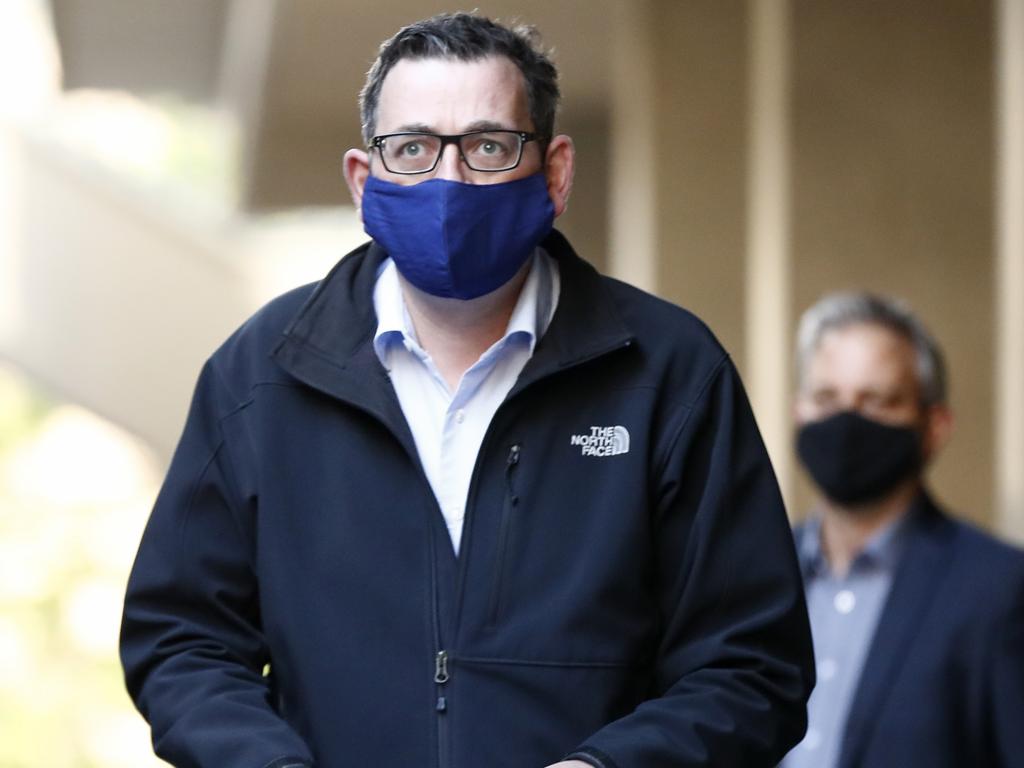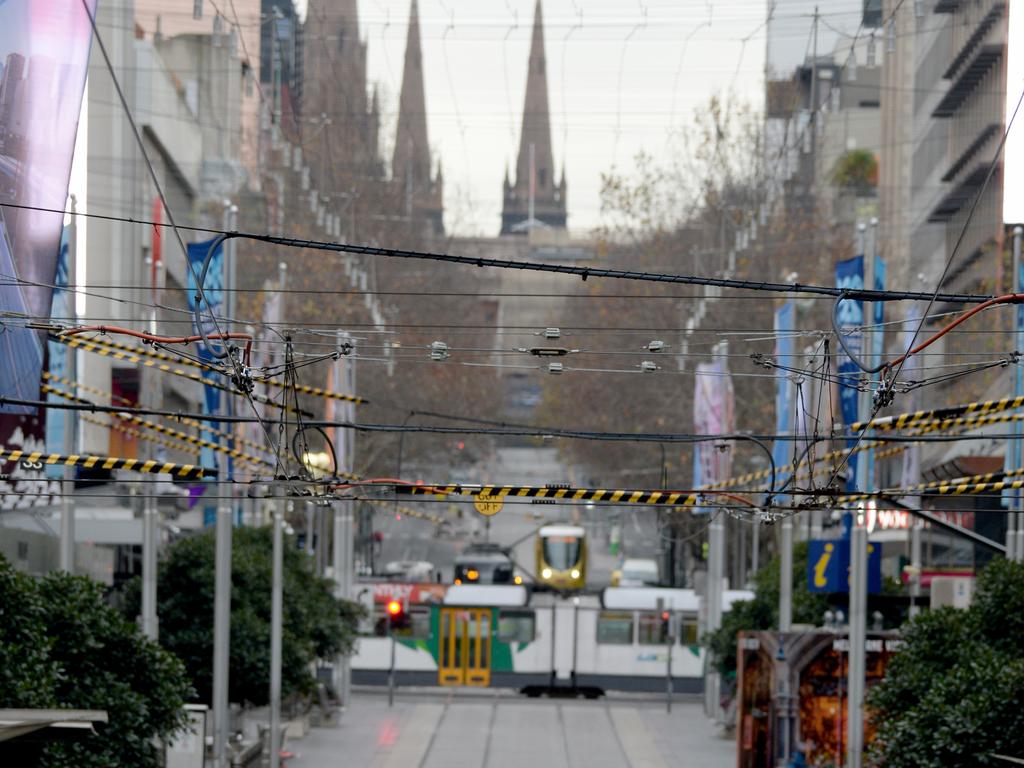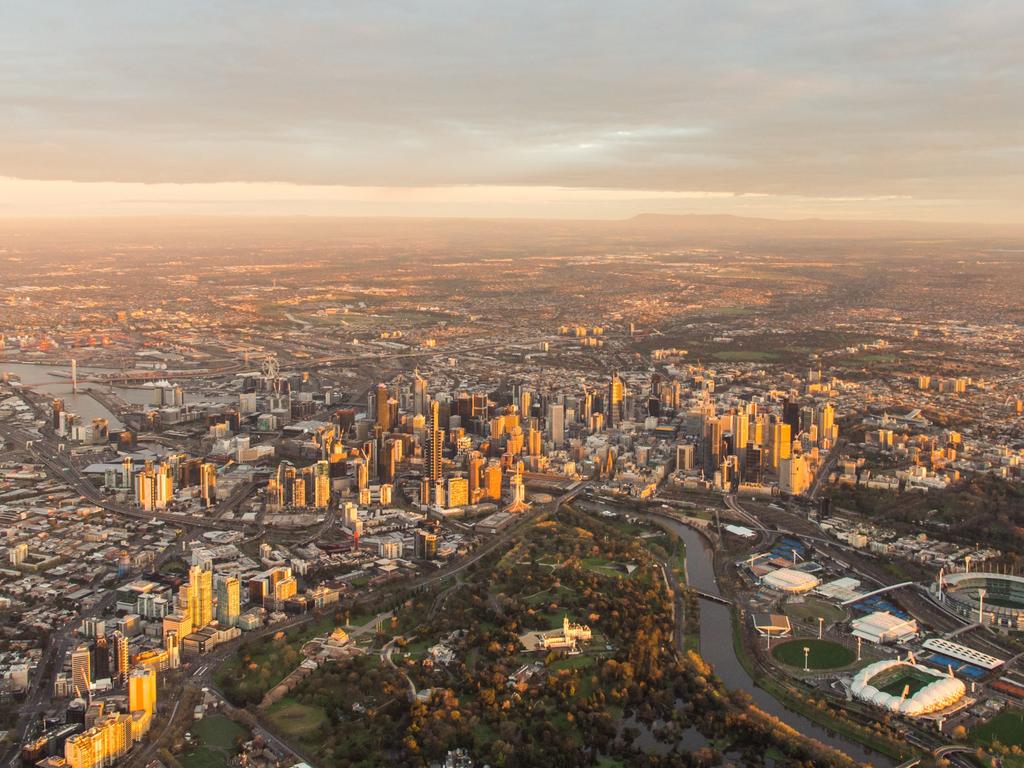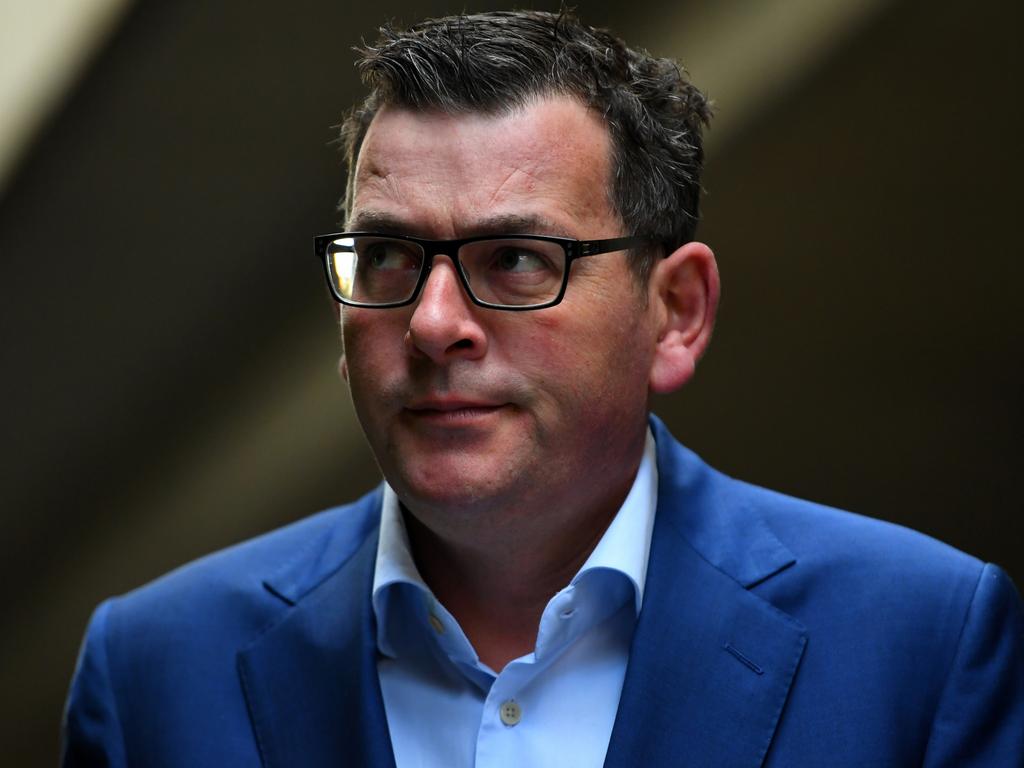
But for complex social and psychological reasons the Andrews experiment is on life support rather than in the political mortuary. His community is still more interested in beating the virus than in revenge politics.
Just as the behaviour of the COVID-19 virus can be unpredictable, so is the state of mind of Victorians as they confront their gravest challenge since World War II. The latest record numbers have stunned an already stunned city, with deaths certain to rise.
“We are in the fight for our lives,” Victorian Health Minister Jenny Mikakos says.
Today the community’s narrowed eyes are focused almost completely on suppressing the killer virus that is marching through the metropolitan area.
The number of strategic errors committed by the Andrews government in critical moments during the pandemic has sparked inevitable national derision.
We know the political cost will be enormous, as will the flow-on effect on the national economy, but we just don’t know for sure when the voter anxiety will turn to retribution. It probably will be months away still, although a high death toll — now distinctly possible — could change everything.
Andrews neatly summed up the health and political landscape when he declared: “A day is like a month in this pandemic.”
The Andrews story is no longer a parochial Victorian tale about a former backroom Labor head kicker’s 10-year leadership and six-year hold on a state. It is now overwhelmingly about the virus death and illness toll, the stalled national economy and how his government has contributed to Lockdown 2.0.
Anthony Albanese has much to be worried about as the Labor vote could easily rebound against his party in Victoria as it did against the Hawke government in 1990 under the weight of the Cain government’s economic collapse.
Until the hotel quarantine scandal, Andrews had largely prospered at home, crushing the state Coalition on the back of an assertive infrastructure program and progressive social agenda.
Andrews, clearly spooked by the health challenges facing Victoria, insisted this week the national cabinet was behind him but the best bet is that many of its state-based membership are 500 miles behind him. This tepid support among rival state governments is best illustrated by NSW Deputy Premier John Barilaro’s off-Broadway attempt to snatch the best of Melbourne’s major events, which are the Victorian capital’s raison d’etre.
“The Australian public has been through such a tough time, we don’t want to cancel morale-boosting and iconic events if we don’t have to,” Barilaro offered to The Daily Telegraph.
There will be many Victorians facing sickness and unemployment who will have seen this Barilaro intervention as crass.
For there is deep and justified fear gripping large parts of Melbourne that is driving the complex community response to the Andrews government’s failures on COVID-19. The virus is on the march from the city’s north and northwest and Lockdown 2.0 has become a deep psychological challenge, which is bleeding into the politics of the virus fallout.
There is no safe place to hide in the southern capital. The virus is entrenched and scooting across the lockdown zone at a great rate, with five local government areas recording more than 200 active cases and one of these on the edge of breaking 300.
Total coronavirus cases have doubled to 5165 in Victoria in less than a fortnight and there are 2462 people with active symptoms. Disturbingly, there are 394 health workers who have contracted with the virus and 935 cases that may indicate community transmission, which raises the spectre of the crisis deepening rather than abating.
There is an overwhelming sense that people want Andrews to win this fight.
Children are not coping as well as they did in Lockdown 1.0, their optimism robbed by stop-start shutdowns and the relentlessly bleak media coverage.
The government restrictions are being broadened again, harshly containing movement, at the same time that Victoria’s Chief Health Officer Brett Sutton has expressed very cautious optimism that the virus can be beaten.
In the best-case scenario, Friday’s announcement of a record 428 new cases marks the peak that health authorities are so desperately searching for. But Sutton also was clear on Friday: “We have not turned the corner here. There will be dozens of individuals who will require hospitalisation out of these 428 people. Tragically, there will be several who will require intensive care support and a number of people will die.”
Where there was blue sky for thousands of businesses in May, there is thunder in July, and the state and the nation are galloping towards the rudest economic shock in possibly 100 years, exacerbated by the Victorian failures.
The anger among the non-Victorian states and territories is entirely understandable after the breakout was linked to a hotel quarantine system that was being policed by undisciplined and unscrutinised security guards who became infected.
The Andrews blunders have created a national challenge. The blunders are not limited to quarantine and include the weak messaging on the Black Lives Matters protest march, contradictory signals on schools, prevaricating over the use of the Australian Defence Force to help the response, and questions over the testing and tracing rollout. The Andrews government, including Sutton, is still refusing to release genomic testing results, which many believe will confirm that key parts of the outbreak are linked to failures of the initial hotel quarantine system.
The NSW outbreak at the Crossroads Hotel at Casula in Sydney’s southwest has been linked to Victoria and there is little wonder those to the north of the Murray are worried as many thousands of Victorians have already crossed the border in recent days.
There are powerful reasons to believe the political wave has crashed over Andrews and he is already politically dead. But such is the dread of the virus, it has created a counterintuitive narrative among some in the community, where they seem to be calculating that he should be given his chance to right his government’s wrongs.
That narrative says that failure was inevitable; that the world experience has been that COVID-19 is a resilient and dangerous opponent, as witnessed by Singapore, South Korea and other notionally successful countries. There are also those in the Morrison government who fundamentally believe the best outcome is the virus’s defeat rather than political pointscoring, with any retribution to come after the event.
Melbourne-based Josh Frydenberg has told Inquirer that a united national front remains the only option. “It’s going to be hard but, working together, we can make progress on the health front and get our state back to where it needs to be,” the federal Treasurer says. “This is not a time for state of origin, with one state pitched against another; rather it’s a national mission to flatten the curve and protect lives and livelihoods.”
Other members of the Morrison government are less kind, with one senior government figure telling Inquirer: “Victoria has f..ked it for the country.”
Many of Andrews’s more strident critics were never on his side, leading to extreme criticism that is based as much on the loathing of what they think goes on in Victoria as compared with what actually occurs. It has focused unnecessarily on Andrews’s factional leanings and progressive social policies rather than the facts of the pandemic. The Victorian health system is not seriously deficient or lacking in resources. The general rule is that if you are sick in Victoria, you will be treated well. What the health system lacks overall is credible leadership, falling victim to bloating, indecision and a sense of bureaucratic complacency that stems from six years of using the portfolio as a political weapon to win and retain government.
Andrews has overseen the pandemic response but at his side has been his Health Minister, Mikakos. She is no political heavyweight, with some colleagues privately expressing alarm that she was ever elevated to the post. That she is a potentially competent junior minister but fighting out of her division in health. Mikakos as much as anyone is in strife.
“She is out of her depth,” state opposition health spokeswoman Georgie Crozier tells Inquirer. “In such a critical portfolio area it beggars belief how she was ever given the position and still holds it.”
Under Victorian state of emergency protocols Sutton has additional powers to issue directives to help contain the spread of the coronavirus, which means health officials effectively tell police what is needed. Mikakos is not as powerful as Andrews but in a health policy sense she is his superior. While Sutton and his deputy Annaliese van Diemen have been exposed to some strident criticism, Mikakos has seemed largely to have escaped, even though the Department of Health and Human Services is in the line of fire over the slack hotel quarantine arrangements.
Andrews is still refusing to account for how the quarantine debacle was ever allowed to happen, even though he well knows the broad narrative. He knows what policy and departmental decisions failed yet has kept the community uninformed. This undemocratic response has allowed Andrews and Mikados to hide behind a looming judicial investigation that will be over ridiculously quickly. This is deliberate. While it officially starts on Monday, its findings will be in the hands of Governor Linda Dessau on September 25. Evidence will not be heard until next month.
It was reported this week that senior health officials were warned from the get-go that the quarantine scheme would struggle under the security guard arrangements and that police should be called in. If so, this is an unforgivable oversight that deserves retribution against those responsible, including the minister. Sutton says it is conceivable that all the active virus cases in Victoria were linked to quarantine failures. On what we know today about Andrews’s mistakes during the pandemic, he normally would have walked or been forced into the mother of all mea culpas. So far we have neither.
The further complicating factor is that there is no obvious successor capable of doing a job better than Andrews in such extreme circumstances. His Attorney-General and friend, Jill Hennessy, and Co-ordination of Transport Minister Jacinta Allen are mooted as possible replacements in the event of a resignation. They are capable of leading, but would they do a better job than Andrews during this unprecedented health scare?
This once-in-a-lifetime event has entered a highly emotional phase. The economy was retrievable until the fresh outbreak but is now under even greater threat. We are staring at potentially large-scale loss of life. If this crisis deepens and the government is nailed by the judicial inquiry, how long could the Labor caucus justify retaining Andrews at the helm?








Daniel Andrews’s premiership has been smashed and his legacy imperilled. He has had a horrible month; in normal circumstances the Victorian Premier might already have walked.